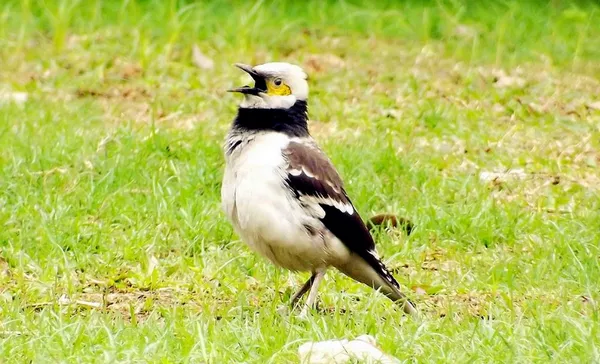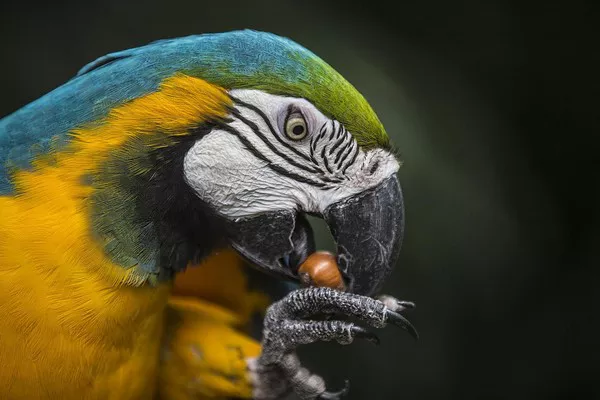The Sun Conure, also known as the Sun Parakeet (Aratinga solstitialis), is a vibrant and charming member of the parrot family, renowned for its striking plumage and engaging personality. Native to the northeastern parts of South America, particularly the coastal regions of Brazil, Suriname, and French Guiana, these birds are characterized by their brilliant orange, yellow, and green feathers, which give them a sun-like appearance.
Sun Conures are medium-sized parrots, measuring about 12 to 14 inches in length from beak to tail. Their diet in the wild consists of a variety of fruits, seeds, nuts, and insects, which they forage for in the tropical forests and savannahs where they reside. In captivity, their diet needs to be carefully managed to ensure they receive all necessary nutrients.
Temperament and Social Needs
Sun Conures are known for their playful, affectionate, and sometimes noisy nature. They are highly social birds and thrive on interaction with their human companions or other birds. Their vocalizations can be loud and frequent, often described as a series of high-pitched squawks and whistles. This behavior is part of their natural communication and social bonding process.
In their natural habitat, Sun Conures live in flocks, which helps them develop their strong social skills. They require a lot of attention and mental stimulation in captivity to prevent boredom and stress. This need for social interaction is why they can become closely bonded with their owners, often seeking out physical contact and play.
Reasons for Shaking in Sun Conures
Physical Causes
Temperature Regulation
One of the most common reasons a Sun Conure might shake is related to temperature regulation. Birds often shake or fluff their feathers when they are trying to warm up or cool down. In cooler environments, a Sun Conure might shake as a way to generate warmth, particularly if they have been exposed to drafts or if their living environment is too cold. Conversely, if a bird is overheating, it may also shake as a response to high temperatures.
Illness or Pain
Shaking can sometimes be a sign of illness or discomfort. If a Sun Conure is shaking excessively or in combination with other symptoms such as lethargy, loss of appetite, or abnormal droppings, it might be suffering from a health issue. Common illnesses that can cause shaking include respiratory infections, gastrointestinal problems, or even neurological disorders. If shaking is accompanied by other signs of illness, a visit to an avian veterinarian is necessary to diagnose and treat the problem.
Nutritional Deficiencies
Shaking can also be linked to nutritional deficiencies. Sun Conures require a balanced diet to maintain their health, and deficiencies in essential nutrients such as vitamin A, calcium, or B vitamins can lead to physical symptoms, including shaking. A well-rounded diet, including fresh fruits, vegetables, and high-quality pellets, is essential for preventing nutritional imbalances.
Psychological Causes
Stress and Anxiety
Sun Conures are sensitive to changes in their environment and can experience stress and anxiety from various sources. Changes in their routine, the introduction of new pets or people, or alterations in their habitat can trigger stress responses. Shaking can be a physical manifestation of this emotional strain. Providing a stable and secure environment, along with plenty of social interaction and enrichment, can help reduce stress-related shaking.
Boredom
Mental stimulation is crucial for the well-being of Sun Conures. Without adequate mental and physical enrichment, these birds can become bored, which can manifest in behaviors like shaking. Boredom can be alleviated by providing a variety of toys, puzzles, and activities that engage the bird’s natural foraging and problem-solving skills.
Behavioral and Environmental Factors
Hormonal Changes
Hormonal changes can also influence a Sun Conure’s behavior. During breeding season or periods of hormonal fluctuation, birds might exhibit unusual behaviors, including shaking. This can be a result of increased agitation or excitement. Ensuring that the bird has a quiet and comfortable space can help manage these behaviors.
See Also: Do all African grey parrots have great talking abilities?
Lack of Social Interaction
As highly social birds, Sun Conures need regular interaction with their human caregivers or other birds. Lack of social interaction can lead to feelings of loneliness or insecurity, which might be expressed through shaking. Regular, positive interaction and companionship can help mitigate these issues.
Diagnosing and Addressing the Issue
Observation and Assessment
To address shaking in a Sun Conure, careful observation is crucial. Note the frequency, duration, and context in which the shaking occurs. Observe if the shaking is accompanied by other signs such as changes in eating habits, droppings, or feather condition. Documenting these details can provide valuable information for diagnosis and treatment.
Veterinary Consultation
If shaking persists or is accompanied by other concerning symptoms, consulting an avian veterinarian is essential. A professional will be able to perform a thorough examination, including blood tests, X-rays, or other diagnostic procedures, to determine the underlying cause of the shaking. Early intervention can prevent more serious health issues and improve the overall well-being of the bird.
Environmental and Behavioral Adjustments
Adjusting the bird’s environment and routine can also help address shaking caused by stress or boredom. Ensure that the bird’s cage is in a safe, draft-free location with appropriate temperature controls. Provide a variety of toys and enrichment activities to keep the bird mentally stimulated. Establishing a consistent routine and offering regular interaction can also help alleviate stress and anxiety.
Dietary Improvements
Reviewing and improving the bird’s diet can address shaking related to nutritional deficiencies. Ensure that the diet is well-balanced and includes a variety of fresh fruits, vegetables, and high-quality pellets. Consult with an avian nutritionist if necessary to create a diet plan that meets all of the bird’s nutritional needs.
Preventative Measures and Ongoing Care
Regular Check-Ups
Regular veterinary check-ups are important for maintaining the health of a Sun Conure. Routine exams can help catch potential health issues early and ensure that the bird is in good condition. Regular weigh-ins and assessments of feather and skin condition can also provide insights into the bird’s overall health.
Enrichment and Interaction
To prevent boredom and ensure the mental well-being of a Sun Conure, provide regular enrichment activities and interaction. Rotate toys and introduce new challenges to keep the bird engaged. Regular playtime and training sessions can strengthen the bond between the bird and its owner while providing necessary mental stimulation.
Proper Housing and Environment
Ensure that the bird’s living environment is clean, safe, and appropriately sized. Regularly check for hazards such as drafts, temperature fluctuations, and toxic substances. A comfortable, secure environment will help reduce stress and promote a healthy, happy bird.
Conclusion
Shaking in a Sun Conure can be attributed to a range of factors, from physical health issues and nutritional deficiencies to psychological stress and environmental factors. Understanding the characteristics and needs of this vibrant parrot species is crucial for addressing and preventing such issues. By providing proper care, regular veterinary attention, and a stimulating environment, you can ensure that your Sun Conure remains healthy and content. If shaking persists or is accompanied by other symptoms, seeking professional guidance from an avian veterinarian is essential for diagnosing and treating the underlying cause effectively.
Related Topics:
























